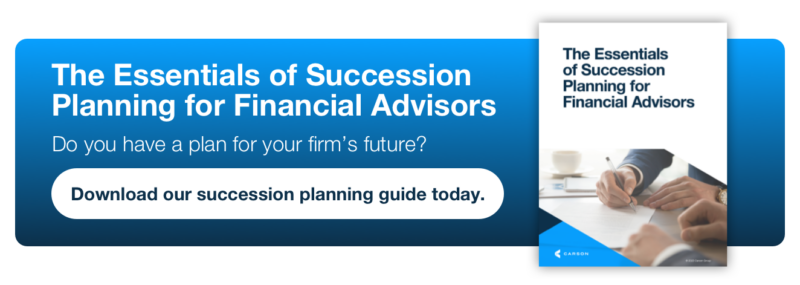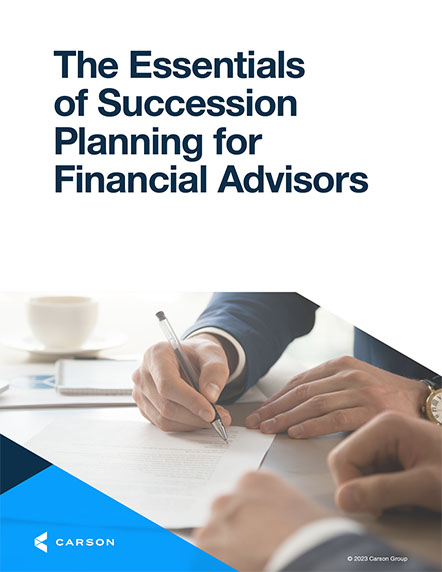You tell your clients they shouldn’t leave retirement planning to the last minute. The same applies to your business – specifically, with succession planning for financial advisors.
Ideally, when you leave, you smoothly transition your clients and staff to another advisor who fairly compensates you for the book of business.
But this process doesn’t happen overnight. To ensure success, you should start preparing up to 10 years before your planned exit. That way, you have plenty of time to find the right successor, set the deal terms and complete the transfer.
According to research from Cerulli Associates, 37% of advisors expect to retire within the next decade. The time to start figuring out your succession plan is now. Here’s what you should consider.
Table of Contents
Succession Planning for Financial Advisors
Succession planning is an expected, scheduled transition out of your practice. You’re looking ahead to an event you control, like retirement. Planning for succession is different than continuity planning, where you determine what would happen in the case of your sudden death or disability. Both are important. If you have neither, prioritize the continuity plan first.
Retirement is the most common end goal for a succession plan, though that’s not the only possibility. An advisor in their 40s might use a succession plan to move out of the industry and fund the next chapter of their career.
A succession plan often involves a buy-sell agreement, a legal document that covers who would buy you out and for how much, but succession is much more than that. You still need to figure out how you’d put that plan into practice by thinking through the timing, the process and the potential challenges of transferring your firm to someone else.
Choosing a Successor
Important Traits
If you don’t have a successor already, look for someone with a few key traits. First of all, are they a good culture fit for your current set of clients and your staff? You need someone who will work well with both sides.
The successor should have a CEO mindset to continue growing your firm. You might have someone internally who is a fantastic advisor, but doesn’t have the right business ownership mentality. There’s nothing wrong with someone who focuses only on being a quality advisor, they just may not possess the traits to run your firm.
The financing side is also incredibly important. Can the other advisor afford to pay the market value for your book of business? The firm is a success because of your years of hard work, risks and sacrifice. You deserve to be compensated for that.
And to close with an obvious one, your successor should be someone who expects to continue working for many years. You don’t want someone to buy your firm and immediately sell again. Too many transitions disrupt clients. A successor is usually younger, but not always. One 60-year-old may be ready to retire, while another might want to work another 20 years.
Possible Successors
An internal hire: If you’re already working with someone you’ve evaluated to be a good potential successor, that’s a good start to a smooth transition. They already know your clients, your staff and your processes. You also may feel better leaving the firm to a colleague who helped you build the business. Alternatively, if you don’t have an internal successor yet, you could hire someone now with the goal of preparing them for the future deal.
The concern with this approach is whether the successor can afford the fair market value of your book of business. An internal advisor likely will not have existing resources to buy you out or the assets to qualify for financing.
You might feel like you should give a discount, but you’ve worked your entire career to build your firm, and it’s not fair to take less than what it’s worth. Instead, consider a break on the deal terms rather than the valuation itself. For example, you could offer seller financing at no interest.
For Carson Partners looking to sell their business to a next-gen advisor, Carson can step in and take a minority stake to help make the deal more affordable for your team member. We can also connect your team with our financing partners who can provide the necessary capital to get a deal done.
Another local advisor: As you get to know other advisors, you might find one who you like and who also is looking to expand their practice through M&A. They likely have more resources than an internal hire. For example, they could take out a loan secured by their existing practice. They are also experienced in the business, so you don’t have to train them. The downside, though, is that they are likely operating on different systems. There could be more work involved in transferring clients and staff as they get used to different operational practices, materials, software, etc.
A broker-dealer referral: Most major broker-dealers offer their own internal system handling succession planning for financial advisors. It’s another simple solution because you’re both already on the same system. The downside, though, is you won’t have much time to develop a relationship. You likely will be handing your clients and your staff over to someone who is mostly a stranger, increasing the chance of turnover. This approach could make sense if you’re trying to get out as quickly as possible.
A financial advisor support firm connection: If you work with a partner firm like Carson, you are part of an ecosystem of hundreds of other quality advisors throughout the country. You’re all already on the same operating system, simplifying the work for a transition. Our community is committed to growing together, and our partners meet regularly at exclusive events and development sessions. If you don’t want to network for a successor yourself, Carson can find one for you.
Valuation
A key part of succession planning for financial advisors is determining what your book of business is worth. It’s common for buyers to base valuations on multiples of your EBITDA, which shows your profitability after expenses. Alternatively, if you’re in a captive environment where your firm covers the expenses, buyers look at gross revenue.
In the years leading up to the exit, focus on getting your revenue up and your expenses down. In other words, your goal is to grow without increasing costs (or just grow in a captive environment).
In general, valuations for an advisor book of business fall in a wide range, anywhere from five to 13 times EBITDA. As buyers figure out what price to offer, they consider factors like:
- Total AUM
- The number of households/clients that make up your AUM
- Average client age, to predict how long the typical client will stay after the deal
- Average growth of revenue and expenses over the past few years
Buyers will come up with their own valuation, but you should also calculate to prepare for negotiations. A CFA or business valuation specialist can put this together for you. Carson also offers this service. To get your estimate started, try our free valuation calculator.
Deal Structure
Besides the valuation itself, succession planning for financial advisors requires you to negotiate a deal structure that works for each party. With an internal successor, chances are you’ll need to set up small payments over a considerable amount of time. For example, they pay 10% of the agreed purchase price per year over a decade. Since internal successors likely do not have the same resources or access to capital, they have limited ability to make a large upfront payment.
External buyers are usually in a better position to pay upfront with the rest shortly after. For example, you might get 60% upfront with the other 40% two years later. The remaining payments likely will include conditions such as that the firm’s revenue does not fall below 95% of what it was when you sold. Otherwise, you receive a reduced payment.
Alternatively, if revenue goes up by an agreed amount, you get paid more. This gives you an incentive to stay on and help with the transition. Make sure you understand the possible deal terms as you prepare to sell your financial advisor book of business.
If you currently work with multiple advisors and you’re all selling, you typically want to keep the book of business together for simplicity. To divide the sale proceeds, you’ll need to determine what percentage of the book of business belonged to which advisor. Chances are it’s not even. If you find that 60% of revenue comes from Advisor A, 25% from Advisor B and 15% from Advisor C, that’s how you should structure the sale as well.
Next Steps
Whichever way you think you’ll go with your succession plan, Carson can assist. Carson’s M&A team can determine your current valuation, as well as possible steps to add even more value before you sell.
If you are searching for a deal partner, the Carson Partners network includes hundreds of other advisors. Since they all work on the same operational ecosystem, a deal is much simpler. We even directly buy books of business, which could make sense for your firm. Flexibility is our key advantage in assisting with succession planning for financial advisors.
Whichever way you go, the key is to start preparing now. By putting in this work, you’ll make sure both your firm and your personal finances are well taken care of once you decide to leave. Learn more about calculating and maximizing the value of your firm with our firm valuation calculator.




